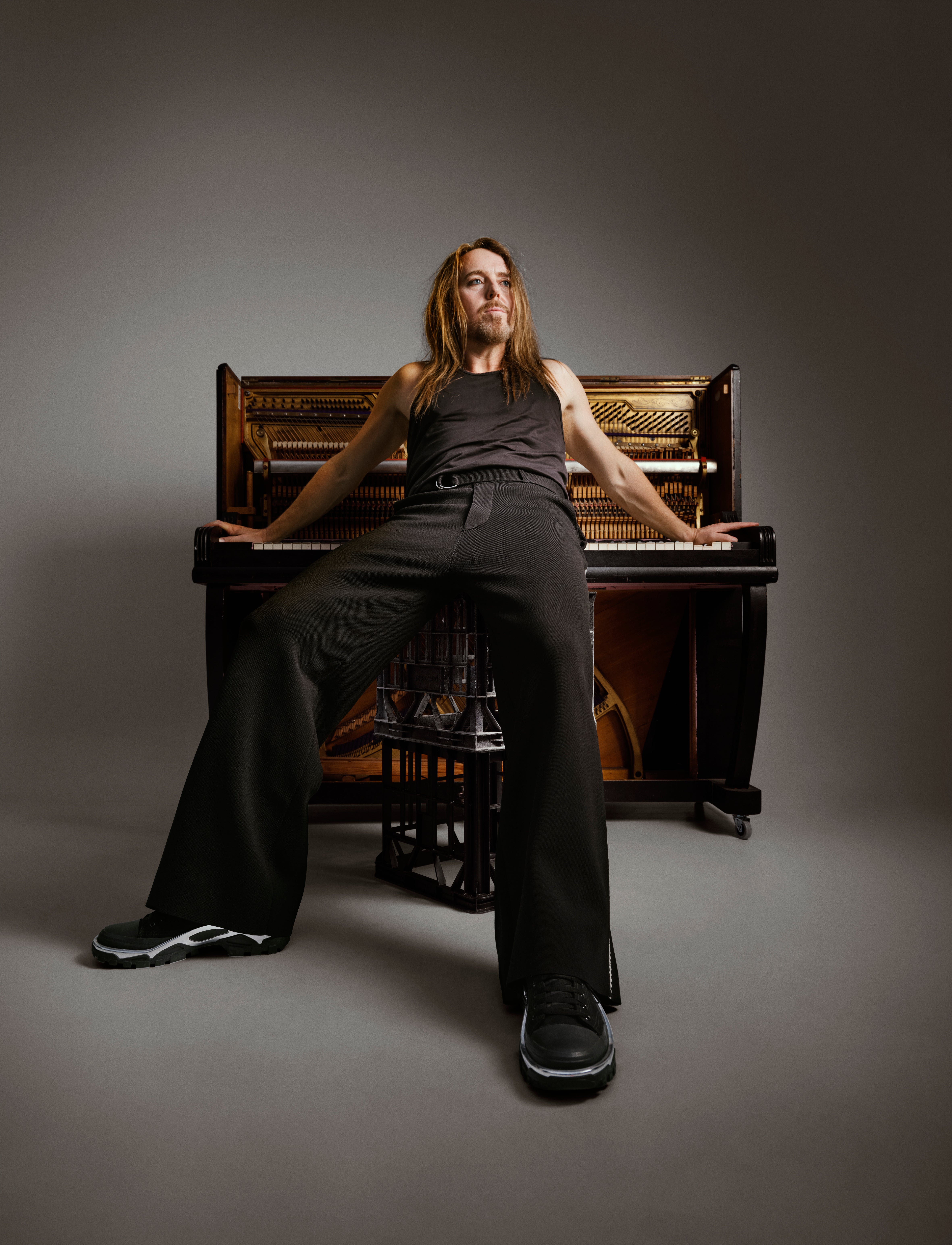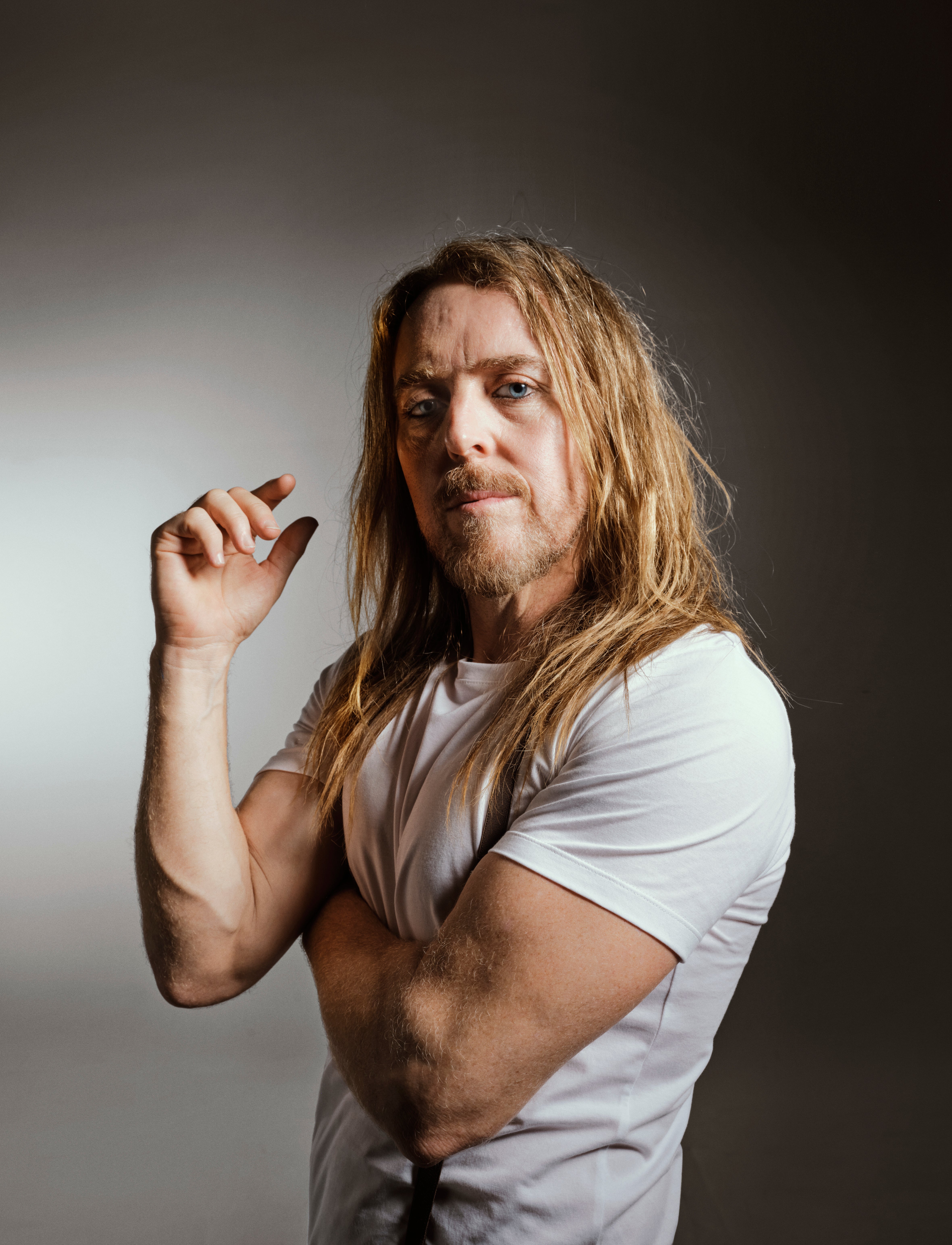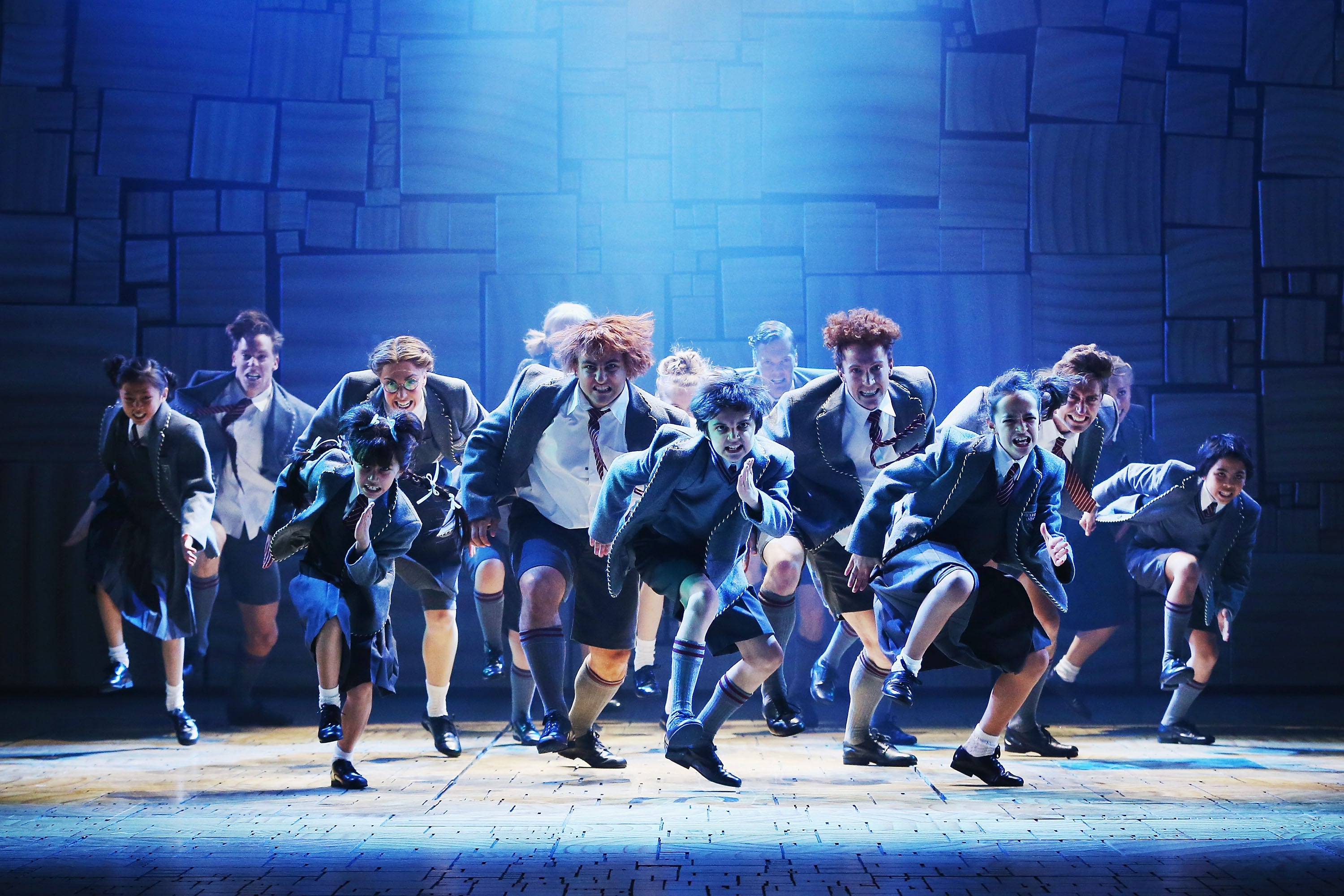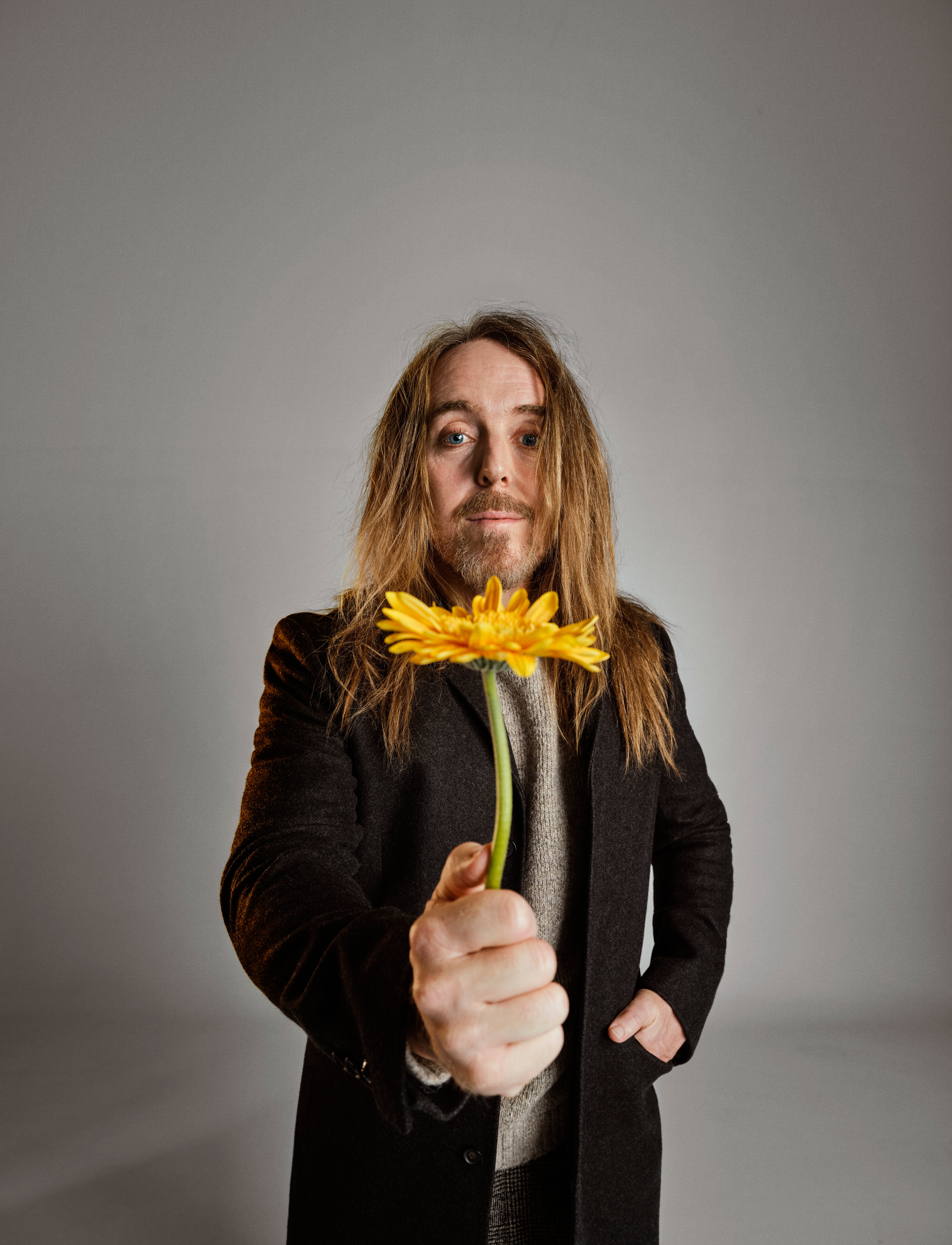Every night at 7.30pm, Tim Minchin’s entire career flashes before his eyes. One minute, the pre-fame Australian comedy rocker is playing his self-effacing grunge prog epic “Rock and Roll Nerd” for 20 people in a tiny comedy club in 2004, painting himself as a “try-hard wannabe” who’s too angst-free, clean-living and lumbered with a piano to ever realise his arena rock star dreams. The next, he’s playing the same song at the Melbourne Comedy Festival in his adopted stage-wear of wild red spider-hair and mascara. Then on TV shows to audiences of millions, to 20,000 fans at London’s O2 or at the Royal Albert Hall with a full orchestra.
This is the walk-on film for Minchin’s latest tour, knowingly titled Songs the World Will Never Hear. And as he emerges for each show to a real-life rock god’s reception, it strikes him nightly that the nerd done good.
“So much of my irony became indistinguishable from non-irony,” Minchin says down Zoom a few days after playing two sold-out Hammersmith Apollo shows. He’s mulling over the question of whether his new album Time Machine – his second collection of properly studio-recorded material, following 2020’s Apart Together – might finally make him the stadium-straddling star of the “Rock and Roll Nerd”’s wildest fantasies. “I’m playing arenas, I’m playing 7,000-seaters on this tour. I have no interest in being bigger than I am.” He recalls opening his 2010 arena tour with the Heritage Orchestra with a song called “In a Cage”, a tongue-in-cheek parody of tortured, egotistic megastars. “I’d be doing these songs in skinny jeans, taking the piss out of being a rock star, and there’d be women in the front rows losing their s***. And that’s just like I’ve joked myself into a reality.”
There’s not a shred of ego to the warm, amenable and self-investigating 49-year-old Minchin that I meet today, even though his success might justifiably have made him Axl Rose’s Aussie doppelganger by now. Once a struggling Perth songwriter, actor and musical theatre composer in the early Noughties, Minchin set aside the more serious side of his music in 2005 to concoct a fully comedic show Darkside – a genre-straddling concoction of faux misery rock pastiches (“Dark Side”), anthemic ballads about ethical shopping (“Canvas Bags”) and love songs to sex dolls (“Inflatable You”), which captured his gift for rhyme and transgressive comedy – “You have a box and you are storable/ Ignorable, back-doorable you.” The show bagged the Perrier, launching Minchin on a meteoric rise which culminated in arena tours and a huge hit when he wrote the music and lyrics for the 2010 stage adaptation of Roald Dahl’s Matilda. The musical earned numerous Tony and Olivier awards, runs on Broadway and across the globe, a 2022 film version and a stint in London that is currently in its 14th year.
Penning a major musical is a very quiet way to become extremely successful, but Minchin’s inner rock god has zero quibbles. “I bought more than one house,” he grins. “There’s no bad. Matilda has no downside. It’s the most amazing, beautiful thing… It kept the RSC alive. It does charity work. Generations of little girls and boys, but particularly girls, their first theatre experience has been watching some kid go ‘read books, be a nerd and stand up for your friends’. I just couldn’t be prouder.” He considers an alternative universe in which he’s best remembered as the guy who sang a song called “F***, I Love Boobs”. “Instead, this is the thing, this harmless, good-doing thing that particularly autistic people love. The letters I get…” He loses his words. “What a gift. [And] I don’t even have to feel too guilty about it because I didn’t get it by hedge fund operating or buying futures against the failure of an African crop.”
Besides the financial security to launch a further musical (2016’s Groundhog Day), branch out into screen acting (playing – irony upon irony – rock star Atticus Fetch in Californication in 2013) and pursue dream projects (“How do I say this?” he ponders, “I didn’t have to do any more work”), Matilda helped Minchin transcend the limited confines of comedy. “It made me go ‘I told you I was real, I told you I was a f***ing composer [and] lyricist, not just a funny song guy’.” It’s something his fanbase (who’ve dubbed themselves Minchkins) have long known; Minchin’s fame was built on the wry, satirical and often intellectual deployment of an accomplished musical talent, a broad stylistic scope – rock, jazz, ragtime, punk and more – and a flair for large-scale songwriting.

In thrall to the wistful wit of fellow piano rocker Ben Folds, he’d skewer social taboos, fame, religion (witness his attacks on child abuse in the Catholic Church on “The Pope Song” and “Come Home (Cardinal Pell)”) and anti-redhead bigotry (“Only a ginger can call another ginger Ginger”, went “Prejudice”) over the course of drama rock epics fit for genuine arena encores. He’d pen fully formed showstoppers specifically for one-off TV appearances – who could forget the fantastic “5 Poofs and 2 Pianos” on Jonathan Ross in 2009? – and pepper his shows with moments of serious reflection and emotion: “Not Perfect” or the moving portrait of an Australian family Christmas, “White Wine in the Sun”.
“In a silly, chippy way I get irritated when people are like, ‘you’re like Weird Al Yankovic’,” he gripes, amiably. “I’m like, ‘I’m not lyric-replacing, you motherf***er!’ They’re properly complex musically… Particularly in recent years, I’m like, ‘this is a f***ing concert, this is some of the best music you’ll hear’. I think I’ve created something that no one else does, and I’ve earned that by incrementally educating my audience. I slowly earned my right to play what I f***ing want. And actually, for the first time ever, it feels utterly intuitive to me, because I’m 50, my fans know who I am, it would be so weird to come on and not be half of myself.”
In this spirit, Minchin has recently played tours of solely serious material, and compiled Time Machine from songs he wrote in his twenties, both comic – “Dark Side”, “Rock and Roll Nerd” and love-as-aggressive-tumour ballad “You Grew On Me” are all here – and contemplative. He initially recorded the album without telling anyone but the players involved, intending to put the recordings online for fans who wanted to listen to them as proper songs without comedic pauses or crowd laughter.
“I never recorded them [before] because f*** recording comedy songs,” he says. “They’re made to be laughed at, it’s a two-way thing. But in amongst them are songs that stand fine as quirky turn-of-the-century pop.” The more he recorded, the more of his early work he reassessed. “It opened a bit of a Pandora’s box of, well, just because comedy took off, that doesn’t mean all the songs I wrote in the decade before were s***. Because I didn’t make it as a songwriter in my twenties doesn’t mean that’s just all for the bin.”

When he was convinced by his record label to make the recordings into an album, Time Machine began to take on a more life-assessing significance. Looking back at the “Rock and Roll Nerd” two decades on, for instance, comes with no little pride. Minchin still recognises himself in it – the middle-class, privately educated Nineties grunge and hip-hop fan studying piano after hockey training from the age of eight. But he’s pleased with the honesty of the portrayal. “I didn’t do what a lot of my middle-class muso peers did and pretend to be troubled,” he says, “culturally appropriating damage and even blackness. To my credit, I turned the camera on myself and went, ‘I got nothing, bitches’.”
What he finds strange now is hearing the young Minchin so easily abandon ambition. “[There’s] this ‘f***ing hell, you had decided at 28, 29, that you were going to let yourself just be a poor muso’,” he admonishes himself. “At some point in my late twenties, I went, ‘y’know, I think this is me’. The irony being, of course, the moment I wrote that song, people started listening.”
In “Understand It”, Minchin – an outspoken atheist – finds the roots of his determinist philosophy, the idea that all events can only occur in one possible way, decided by external factors. “I don’t believe you can really sensibly argue that free will exists,” he says. “I say ‘it’s not karmic destiny, it’s just consequence devoid of meaning’. It’s just s*** happens because it happens, because we live in a deterministic universe. That can make you a bit cynical, but it makes me think the world’s very beautiful…. Every single tiny thing that happens changes the rest of your life. We’re just f***ing marbles. I like it.”

Sensitive recent singles like “Not Perfect” and “I Wouldn’t Like You” concern our struggles to become comfortable with ourselves. Twenty years on, has Minchin? “I feel like just in the last couple of years, the benefits of being 50 have started to sit upon me,” he muses. “I’ve been so lucky because I have a weird f***ing life. If this is who I was in my twenties, then these were my wildest f***ing dreams, what I’ve [been able] to do. And with that comes the humbling realisation that nothing fixes everything. My wildest dreams have been exceeded artistically, wealth-wise, and the other side of the coin is there’s an extent to which you’re just f***ing you, and the feelings you have about you stay. So I don’t know whether it’s because I’m getting older or because I’m finally letting myself enjoy instead of feel guilty for the good things that have happened to me [but] in the last couple of years I’m like, it’s OK, you can’t fix everything, you can’t be everything, just sit in it.”
After all, not everything in Minchin’s life has grown on the world like a tumour. In the wake of Matilda’s success, he quit touring for a time and relocated his young family to Los Angeles to pursue a parallel career in acting and directing. He speaks happily of the period (“end of our youth… we got a trainer and just leant into LA”) but “Leaving LA”, the song he wrote about returning to Australia after his animated DreamWorks film project Larrikins collapsed, painted a fond yet savage picture of a churn-’em-up city full of manipulative agents and blood-sucking studio execs.

“It’s a f***ing s***hole,” he laughs, semi-serious. “Broadway and LA, they’re just brutal. They’re ruthless. I don’t think it’s necessary, this performative ruthlessness, this idea that art is a competition is kinda gross. And yet, I spent such happy times in that studio talking about the texture of feathers and how this pelican would sound if it was doing a spiritual chant, and working with Hans Zimmer on the score, directing Naomi Watts dying on a microphone. I had fun, but it’s devastating to do that much work, and it was going to be such an amazing project. I’ve had to just go, you win some, you lose some.” As an artist who decided against releasing the song he wrote including the lines “f*** America, f*** its Teflon self-esteem” and “f*** Donald Trump”, how does he feel his work might go down if he’d stayed? “I think it might ping some alarms. It’s a f***ing nightmare. The whole discourse is a nightmare though. Trump is an outcome of a bunch of things, including the unbelievable smug misbehaviour of the progressive left.”
It’s an angle which also arises when talk, inevitably in a proper rock star interview, turns to Kneecap. Minchin has an old song called “Peace Anthem for Palestine” – an idealistic plea for the Middle East’s warring factions to find peaceful common ground in their dietary restrictions (“if you don’t eat pigs and we don’t eat pigs, why not not eat pigs together?”) – which he doesn’t play any more.
“I think artists should be activists, but I think the more educated you are, the better an activist you can be,” he says. In quick succession, he reels off references to the Ottoman empire, the origins of Hanukkah, Iran’s funding for radical Sunni armies, the Iranian revolution, Western incursions and the influence of Russian money as a handful of the myriad issues clouding and complicating the situation. “You can still come to the conclusion that Gaza is a genocide, you can still hate Israel, just the balls on you to speak on this subject right now I admire, but I hope they’re doing all their reading… The more you know, the harder it is to speak clearly about [it], and the more you suspect that maybe you’re not the right person to speak about it.”
And is Minchin the same person who wrote “Peace Anthem…” anyway? In looking back at the young man behind Time Machine, he cites the Ship of Theseus paradox. “You replace every plank and it’s still the same ship? I totally get that feeling. ‘Am I me? Everything’s changed.’ I find myself talking about him in my head in the third person, because I feel like he’s him. And the further back you go, the more you think, ‘Oh, that little kid that went to school, he was scared’, or whatever.”
Today, the rock’n’roll nerd of 2004 counts Brian Cox, Ian McEwan, Richard Dawkins, Stephen Fry, Bono and Robbie Williams among his megastar mates, commands a formidable audience of fanatics and “odd cat” devotees (“there’s a lot of neurodivergents in my audience”) and has amassed enough riches to buy a new canvas bag for every supermarket trip. But he’s still the settled, happily married, well-adjusted middle-class dreamer at heart. “The one I’m baffled by is 2005 to 2010,” he says. “The person who had two babies and wrote Matilda and went from cabaret venue to orchestras at the Albert Hall and didn’t get drug addicted and didn’t f*** all the people. I’m pretty proud of him.” He beams down the camera, happy not to have joked himself entirely into rock god reality. “I might have grown to be an obnoxious, over-talking c***,” he says, “but I could have become a worse c***.”
‘Tim Minchin Time Machine’, the new album by Tim Minchin, is out now





